|

Flame azalea, Rhododendron calendulaceum.
(*photo credit)
May 1, 2011
Gratitude Leading to Mercy
Today
we celebrate "Mercy Sunday." Perhaps it is a perfect time to see that God has
shown us mercy in the coming of Christ, in his resurrection from the dead, and
in the sending of the Holy Spirit to inspire and teach us. Mercy has been shown
and shared, and this calls for mercy in return. We profess our belief in a
loving, merciful God, and in trying to be godly, we show love and mercy in our
own service for others.
Love and mercy overcome any
tendency to be vindictive to our fellow human beings. Often we may feel they
are not doing the right thing -- true, but what can we then do about it? We can
express our disfavor, or how much it hurts us. In response to their saying that
their own actions are private, we need to counter that all action has a social
dimension and consequence. We are convinced of this religiously, practically,
and scientifically. The first law of ecology is "Everything is connected to
everything else." What you do affects me, and so your action is my concern.
Mercy is knowing this and still loving the other all the while.
Mercy
means assisting those who want to change their own lives, namely, those who in
the past have been overburdened by prison records, or failures in work, or
mistreatment of individuals, or acting in an immature manner. People change and
must be given the benefit of the doubt without causing us who are assisting to
become gullible or off-guard. Accepting the possibility of change is an act of
mercy that our government, courts, communities, and family members must foster
in order to improve the social life of our community and world. Ultimately,
forgiveness and mercy can be fused into one attitude.
Mercy
means being sensitive to those who have handicaps in a spectrum of practices,
from the way they speak or interact to what they do and how they live.
Affluence often breeds insensitivity; thus we must examine our approach to
others in our society and give them the room it takes to operate and find
themselves. God shows mercy in giving us the time to know ourselves, reform our
ways, and start to act in a more perfect manner. If this is the case in our own
lives, so ought we to allow time for others to overcome their shortcomings and
change for the better. With each incremental change we must show recognition
and genuine encouragement to see the struggling person that we value their
success. In fact, our entire culture has to do just this so we can heal our
troubled Earth.
Prayer:
God of mercy, you wash away our sins with water,
you give us new
birth in the Spirit,
and redeem us
in the blood of Christ.
As we celebrate
Christ's resurrection
increase our
awareness of these blessings,
and renew your
gift of life within us.
(Opening prayer on the
Second Sunday of Easter)
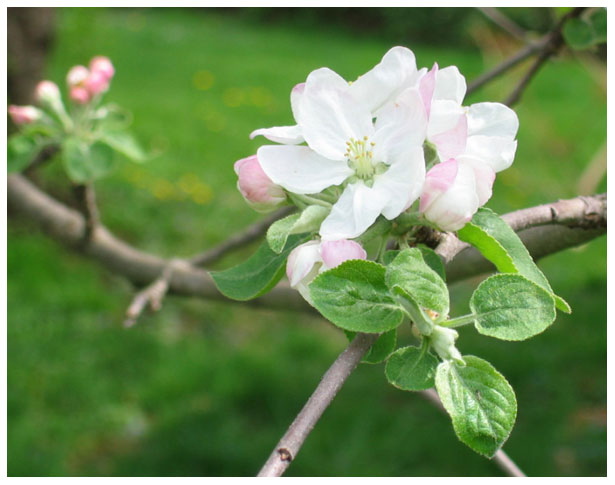
Blossoms of May. Woodford Co., KY.
(*photo credit)
May 2, 2011 The Little
Blue Book: A Blueprint for Radical Change
We
are now releasing the entry that was in draft form for the past nine months,
namely The Little Blue Book. The purpose of this work is to reveal the
theoretical underpinnings of the upcoming book "Reclaiming the Commons." The
primary inspiration is to counter those who said that this call for "radical
change" is based on some Marxist or Communist writings; this is simply not the
case. I have always been a radical, but this outlook has a religious foundation
and not a basis in past political thought of any type. Mary indicates that the
lowly rise and those in high places are brought low. Yes, God brings this
about, but we are God's instruments in this noble work.
In contrast is the
championing of those in high places. I have always had great differences with
"Prosperity Christianity," which seems to be the work of a Godless capitalism
alien from the "Jesus" in whose name we stand. This aberration of religious
practice, where the more religious and those to be emulated are the wealthy and
those in power, negates some efforts at ecumenism. The social and economic
foundation of the prosperity people is false and it blurs the spreading of the
Good News -- that the lowly will hear and respond to God's word. Unless we
confront materialism directly and its move to world domination, we will allow
our planet to be wrecked. A world of superrich and destitute is not stable, and
all the military might in the world cannot contain this unstable condition.
A
first degree of humble service: The desire to know justice and to extend
this knowledge to all people of good will is essential. This refutes a basic
denial of current conditions of vast disparity of wealth and power. To know the
poor is the first step to salvation, but only the first step, and not totally
sufficient in itself to bring about change -- mainly because knowledge does not
automatically produce action. Those who know may opt to distance themselves
from the difficult struggle.
A second degree of service
is to enter into solidarity with the people who suffer. The serving person
wants to help but on his or her own terms. However, this is still largely
theoretical and allows the one who enters to find time to escape into the world
of allurements, because the task is so difficult and all consuming.
A
third degree of service is to identify with the lowly. This calls for
action that is so risky that it leads to becoming marginalized. Only when we
risk distancing ourselves from people at the first and second levels are we able
to find ourselves close to Jesus and authentically Christian enough to work with
others who strive to do the same. Thus our ecumenism must be primarily with the
poor throughout the world. It is the Scriptural underpinnings of this third
degree that moves us to reclaim the commons.
Prayer:
Lord, help us get this message out to a world in desperate need of an authentic
approach to social justice.
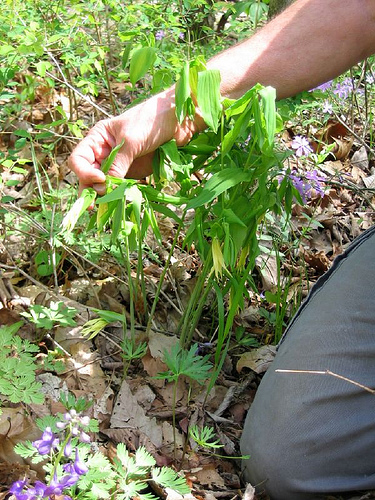
Appreciating the beauty of a spring wildflower.
(*photo credit)
May 3, 2011 Wildflower
Week Is Worth Celebrating
Here
are eleven ways to celebrate Wildflower Week:
* Take a hike and spend time
outdoors, for the foliage is now coming on the trees, and the understory has
only this week or so before the sunlight can no longer reach the flowers of
April;
* If you attempt to seize
the blessed moment of this wildflower season, get the camera and take some
photos, for they are worth viewing, treasuring, mentioning, and sharing;
*
Select your own or a library's wildflower book, and leaf through it for some
samples of what are present in your woods, or absent but worth seeing and
learning about;
*
Learn about one new wildflower this season and tell others about it;
*
Pick a bouquet of exotic wildflowers that are usually found in fields or vacant
lots and arrange them as a decoration for some special place;
*
If you have broadband Internet access, scroll down the months at this website,
especially in spring and summer, and discover how many times wildflower photos
appear in the last five years. There are dozens with few repeats;
*
Generally we refrain from picking anything but exotic species. However, select
a wildflower and press into a plastic laminate to make a bookmark for future
admiring and utility -- these also make a fine gift;
*
Write a wildflower verse or at least think about composing one when the
proverbial rainy day offers nothing else to do;
*
It is not too late; sow some wildflower seeds for this summer's growing season
but do so quite soon. Prepare the soil properly, sow, pat it firmly, and
moisten the surface so the plants will sprout and grow;
*
Support the Transportation Cabinet's efforts to insert wildflower patches at
road shoulders or median strips. While a little distracting to drivers, they
are also uplifting and add beauty and quality to the lives of weary travelers;
and
*
Should you really have time, identify wildflowers and make signs for them -- and
get others to help install the signs so viewers can learn the varieties in your
neighborhood.
Prayer:
Lord, inspire us to learn from the glory and beauty of seasonal wildflowers, and
to see their pristine moment as a sign that we have but a short time to glory in
the sun as well.

Grandma Marietta farming, age 91.
(*photo credit)
May 4, 2011
Aging Can Involve New Adventures
Aging Concerns
It is time to rise,
though it's middle of the night,
Time is fleeting that
will ne'er return,
And blessed sleep fades
away,
Yes emerging eternity
will make us free.
Maybe we have spent the
bedding span
Thinking back with
great regrets,
A purgatory here present
that bespeaks
what could have been if
we were better then.
A day ahead that looks
the same
as yesterday and the
day before;
and what will today and
tomorrow bring?
Mercy, how can it be?
C'est la vie!
Where is the energy to
rise,
to find my footing on
the floor below
and gain balance so no
stumbles occur?
Just to find the light is
a brief delight.
Sleep
long gone by now,
as daytime aches
return to full notice
and I grip the furnishing
while on the way
to find the place to
be, to see, to pee.
Prayer:
Lord, help us to enjoy this time of life,
for it will never be
the same again,
and we had better
make the best of it,
and live this journey
span as best we can.

Distillery wall with Vinca minor, periwinkle. Millville, KY.
(*photo credit)
May 5, 2011 National Day
of Prayer Concerns
Each
week we find ourselves with new prayer intentions -- and so our listing changes
over time. The same pattern occurs during each annual National Day of
Prayer. As mentioned in the entry of May 7, 2009, we offer constant prayers
of praise and thanks to God for our faith, our family, our church, our nation,
our freedoms, our health, and on and on. However, we do attend to special areas
deserving of mention. We beg pardon for past faults of which there were many;
faults that hinder our broader concerns. Now let us recall our current needs
and give them special attention:
*
Thinking about personal and family needs that stand out as though they are the
only real problems;
* Remembering our local
needs and the people who suffer from illness or addiction or the allurement for
material things;
* Confronting our regional
and national budget crises and our unwillingness to tax the rich and cut
wasteful spending of all sorts -- including a war in Afghanistan and the highly
inflated military budget;
* Formulating a coherent
energy policy that addresses climate change and also focuses on replacing fossil
fuels, biofuels from food products, and nuclear power, utilizing instead
environmentally benign wind, solar, geothermal and some hydropower sources;
* Assisting victims of
natural disasters (e.g., earthquake victims in Haiti and Japan) as well as
helping the poor in Africa cope with rising food costs through promoting local
farm programs;
*
Helping to heal the divisions that separate the rich from the poor by overcoming
the disparity of wealth and power;
*
Pressuring our elected representatives to begin a process of improving our
damaged infrastructure in this country and world;
*
Defending the helpless, sick, elderly, and unborn;
*
Breaking the cycle of greed, which seeks to overwhelm those who are voiceless or
timid;
*
Encouraging those who are unemployed and the poor to unite as one people and
take what is rightfully theirs (ours), as a means to a decent life and the
exercise of true democracy; and
*
Purging our self-righteousness and conceit, to humble us as a united people, and
to make us ever more sensitive to the needs of all who yearn for the basic
essentials of life.
Prayer: Lord, teach
us to open our minds to your presence and to soften our hearts with your love.
Mold us as your people into a fitting instrument to do your work.
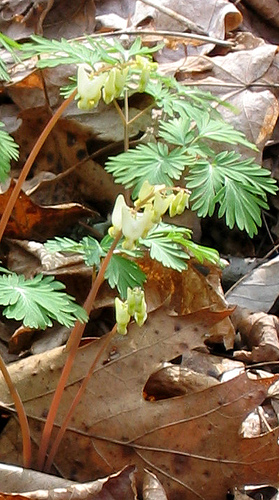
Dicentra cucullaria, Dutchman's breeches.
(*photo credit)
May 6, 2011 "No
New Taxes" versus "TAX THE RICH"
Congress
and political groups struggle over deficit spending and impending indebtedness.
The voices are somewhat muted when it comes to taxation -- a way of answering
these obvious problems of lack of money. Too much money is thrown in the wrong
direction. True, those funds need to be well-spent and for the benefit of all.
What if some are almost getting away with murder by allowing their neighbors to
die without proper food, water, and access to health care?
Some may tell me that since
I pay no income taxes, I have no right to speak. They are correct about the
first point, for my "income" goes into a community pot and to the non-profit
agencies it sponsors. However, there are plenty of taxes that affect us all:
the taxes at the gasoline pump or when we buy laundry soap and pay a 6% Kentucky
sales tax. Proportionally, we in the lower income brackets pay more taxes. A
state property tax was attached to a donated secondhand vehicle based on its
"blue book" value; these are taxes with which we can be and are confronted at
times.
Others
object that billionaires are not murderers but often the most
charitable of citizens. Let's take a look at all three bold terms.
Yes, if we allow the destitute of the world to go without proper medicine and
food and drinking water, then we help kill them -- and if this is done
willfully, when we know these needs exist and still sequester resources, then
that is essentially murder. Withholding resources that must be shared as needed
for their lives is to pronounce death to them.
Charity
is often a misnomer. To give according to the donor's dictates and retain much
wealth is a blatant disregard for democratic process.
Responsible citizenry is
not to swallow gullible myths, but to become vigilant to those who evade
legitimate taxes. In this year of the one hundredth anniversary of the birthday
of President Ronald Reagan, most people consider him the champion of less
taxes -- though his first act as California Governor was to oversee the highest
tax increase by any state government to that time; his federal record as
President included eleven tax hikes.
People
love to construct and defend myths that are untrue -- e.g., ALL Americans are
over-taxed. That is pure bunk! As governments on all levels seek to cut, cut,
cut, the aroused and overtaxed citizens ought to shout, "TAX THE RICH!" We need
to break up the international tax havens and redistribute wealth to programs
that assist those in greatest need. Of course, use money wisely, but allowing
the untaxed to decide is unwise, for such are the ones who started the financial
crisis. Promote "fair" taxes.
Prayer:
Lord, teach us to cease being a complacent citizenry and, through vigilance, to
create a fair system of redistribution of the abundant resources of this nation
and world.

White trout lily, Erythronium albidum. Woodford Co., KY.
(*photo credit)
May 7, 2011 The
Marginalized Activist Dilemma
We once had a worker who it became apparent was determined to become disabled so
as to be funded for life. Unfortunately, that was not a false judgment on our
part. Twice he told us of falling down, and expecting to be seen and thus
observed to be hurt. Twice was enough and so we had to dismiss him; he went on
to another job and within two weeks played the same trick -- and they let him
go. A short while later at his third job, he received his wish. That fall
required a helicopter to airlift him to the emergency ward and, after rapid
release from the hospital, he got the disability status and payments.
In somewhat the same way, we
activists like to describe the story of injustices so that others will take
notice -- but what if no one listens or pays enough attention to give us the
designation of "activist for this or that cause?" What if they say we do not
really exist in their or anyone else's area of concern? This leads some
activists to take more drastic means to receive notice -- the dramatic action
that draws media attention. We have become aware that terrorists practice
extreme activism, mainly through an exit from life by being blown up along with
other, often innocent, individuals. The publicity accelerates the acts of these
copycats and their sponsors. One possible way of halting such terrorism may be
by refusing to report such acts no matter how dramatic they are. In due time
the terrorism would cease because the message is not getting across as a
publicity stunt.
A
counter approach to violent forms of activism is to resort to mercy and love --
for this relies on the spiritual reality of the world in which we live. The
spiritual world accepts temporary marginalization as an imitation of Jesus, who
was marginalized by the establishment of his day. In so doing in a non-violent
manner, this form of activism counts on the trust that ultimate success will
occur, but that our physical presence or even a dramatic exit is not necessary
for success. This form of activism trusts in the spiritual economy of
salvation, and that our good deeds are remembered by God, even if not by those
creating media events. We seek to be the Lord's servants, not winners of
popularity contests.
St. Theresa, the Little
Flower, is our model, for in life she was certainly not in the forefront of
activism, and yet she truly was an "activist" all her life. She prayed that her
practices of love would become known later, even after she had died -- and so it
was as witnessed by her simple autobiography becoming known to the world in many
translations. The miracles attributed to this popular Saint were countless, and
so her prayer was answered, and her activism of love and mercy triumphed.
Publicized activism may be currently successful for all things are possible with
God, but they ought to be motivated by possible long-term results.
Prayer:
Lord, inspire us to be active and yet to realize that the full affects may await
a period after we exit mortal life. Help us here and now see that being is
greater than doing.

A lone shooting star, Dodecatheon meadia. Cedars of Lebanon State Park
(TN).
(*photo credit)
May 8, 2011
Companions on the Road to Emmaus
The disciples recognized
the Lord Jesus in the breaking of the bread. (Luke 24:35)
The
Emmaus episode is an eye-opener for the disciples. The fellow traveler joins in
their walk, speaks to them about the meaning of the Scriptures, accepts their
invitation to eat with them, and shows them who he is in the breaking of the
bread. Jesus is that fellow traveler on our journey of faith, and we are called
to listen to him, to invite him in, and to feed him when he is hungry. His
recognition comes in eating together.
We
are fellow travelers with the Lord. Are we open enough to walk with him -- and
with all who identify with him through their own suffering? Are we willing to
listen to their stories and find Good News there? Are we sensitive to those
wishing to break bread and share with us? Our journey of faith is not just a
"Jesus and me" or a "Jesus and a few of us" story. We need to go out to all who
want to be invited in and ask them to come and share with us. Inviting all into
our home is a physical impossibility, but our hospitality has a ripple effect
that can go out to the world.
*
We need to recognize the God within, a renewed enthusiasm for the awesome tasks
before us. The consolations are here if we but look and see. Much depends on
our willingness to leave ourselves and go out to others, a willingness to share
our faith with the faithless and disheartened.
*
At a time when foreign assistance is being axed in our national budget, the
wealthy continue to take their ungodly profits. We need to ask whether we
recognize Jesus in suffering humanity and are willing to share our resources
with them, and to share in their struggles for justice as neighbor to neighbor.
* Are we willing to share
our journey of faith with others, telling them of the moments of joy and
consolation that we have received? If we open ourselves to sharing with others,
we then encourage them to share more deeply with us -- a meaningful
conversation. Our growth in faith is a gradual process of coming to the Liturgy
of the Word and then, in Eucharistic gratitude, to find Jesus, and to be
impelled to go out and tell others.
Easter people recognize the
victory and hope that are being realized, a faith that something marvelous that
was promised in the past is starting to happen, and a charitable impulse to
share with others here and now. The Emmaus episode is a transition -- a risen
Lord extending to the disciples a mandate to share in a global journey of faith
with Jesus spiritually present to all. All elements, recognized word,
gratitude, and movement forward must work in tandem.
Prayer: Lord, teach
us to recognize you and your word in our midst and to extend the Emmaus journey
to an entire planet.

Awakening of the hazelnut, Corylus americana.
(*photo credit)
May 9, 2011 Social
Responsibility in 2011
Responsibility is the awareness that there is more than gifts to me, rights for
us, and deserving rewards for many. As social beings, we live in a two-way
street, and so we have gratitude to express for gifts, duties related to rights,
and a general sense of responsibility that pervades our environment. Previous
essays on this subject dealt more with what individuals ought to do -- personal
responsibilities. Social responsibilities also extend to all groups in
government, business and local communities. Corporations often follow the
extreme capitalistic expression of "the only social responsibility is to make a
profit." Instead, may concerned citizens regard social aspects of corporate
practice to include a judgment on where and how investments are placed, what to
expect from corporate managers as to conduct, and how much attention ought to be
given to laborers and to local communities.
While
the subject area of social responsibility is quite diverse and nuanced, still
let's give attention to the social aspects of a disparity of wealth. If
everything is connected to everything else (Barry Commoner's First Law of
Ecology), then all parts of this world and all activities have some impact
on other parts. The free acts of individuals make a difference in society, and
thus good deeds benefit and bad ones harm. The same applies to communities
where acts of kindness benefit as well. Thus, if we as groups, or regions, or
nations, use excessive amounts of the world's resources, others are affected in
some way.
The
social dimension of our collective actions enters the purview of the global
arena. Waste and frivolous use of resources, when food prices around the world
are rising, will affect all of us including those who are hungry. What our
nation does has a social dimension, and that applies to citizen individual AND
collective action. We as citizens are socially responsible in the manner in
which we vote, and in our vigilance over elected officials once they are in
office. If such is the case, our national actions are no more isolated than our
individual ones.
Since
our nation is highly influential, the consequences of our collective action are
all the more social in their effects. Thus if the Lord expects us to act in an
individually responsible manner and feed the hungry, the same Lord wants us as
democratic citizens acting collectively, to act responsibly. If we individuals
are condemned by ignoring the hungry when we could have acted differently, a
fortiori, our nation with it many gifts will be so judged. Will we fail and
be condemned?
"When did we (as a people)
see you hungry?" Is the divine reply -- " When you allowed one thousand
billionaires to go uncontrolled and one billion people go hungry, you did it to
me?"
Prayer:
Lord, help us to spread the message of social responsibility to all people, and
to ourselves as one people.

Dicentra canadensis, squirrel-corn. Franklin Co., KY.
(*photo credit)
May 10, 2011 Energy
Efficiency Demands Top Priority
Conservationists
agree that every effort must be made to focus on energy conservation as the
cheapest and most efficient way to meet increased energy demands; this is
especially true as the world climbs out of the Great Recession. Coal, natural
gas, and oil production are booming, and renewable energy alternatives are being
installed at a rapid rate. However, still greater attention ought to be given
to energy efficiency for the benefit of all. Curbing energy use reduces the
demand for more and more powerplants and the corresponding needs for increased
energy extraction, processing and transportation, along with energy wasted in
transmission losses from large-scale electricity generation processes.
Attention
must focus primarily on energy conservation -- for green building materials,
smart grids, transmission systems, domestic and office electronic devices, and
more efficient cars, trucks and planes. Energy efficiency standards for
vehicles, lighting, powerplants, and appliances would go a long way to reducing
energy needs for this decade. A global effort to boost energy efficiency with
existing technologies could cut more than 20 percent of world energy demand by
2020. The International Energy Agency (IEA) has made this conservation approach
a top priority.
Vehicle manufacturers are
currently undergoing painful adjustments to get efficiency averages to 45 or 60
or 75 or even 100 miles per gallon. Several nations and American states are
insisting on fuel-conserving resources of ever greater efficiency. Mass
production of more efficient vehicles as well as renewable substitutes lags
because retooling takes time, especially after recent economic troubles.
Electric vehicles powered by solar energy could help cut motorized vehicles
loose from the umbilical cord of petroleum fuel, but electric vehicles need to
be efficient.
Since
efficiency is a national and global win-win situation, one expects the era of
ever-more-efficient lighting (LEDs and compact fluorescents) and other
electronically efficient practices to be mandated in a short time. Many energy
producers, however, do not take a strong stand on efficiency; their influence is
considerable and their profits are high. When new sources such as natural gas
are found and the relative price of fuels declines, the cost of initial energy
conservation innovations become less attractive. This happens to be the case as
of this writing. Even with all the hype about future petroleum and gas
shortages, there is plenty of fossil fuels to go around right now.
Only
an energy tax could make the difference and get conservation on an equal and
greater par with the fuel producers, processors and transporters. Our resources
are meant for both present and future generations, so let's be prudent in their
use.
Prayer:
Lord, encourage us to be people who do not waste things, and let us see that
energy use is one of those things.

Fresh fruit for May picnic.
(*photo credit)
May 11, 2011
How to Combat High Food Prices
For
the past nine months we have observed rising global food prices. In 2011, U.S.
ethanol production will consume 15% of the world's corn production, up from 10%
in 2008. Unfortunately, this will only increase, for it is part of our
heartland economy. Currently, one million barrels of crude oil (of over 80
million used daily) is "saved" by ethanol substitution -- and global food prices
are rising by 40% this past year. Some 44 million more people enter
food-insecurity poverty levels annually.
Some time back an emaciated
lady and her child came to my door and asked if we still had leftover pizza. I
was unaware of any, but offered instead a share of our storehouse full of
nutritious foods. She replied, "No, we just want pizza." I later found a pile
of rock-hard slabs of pizza in the bottom of the freezer, from a past dispenser
of charity who collected stale pizza from the local commercial outlet. As a
compulsive no-waster I soaked the pizza in tomato juice and microwaved it for
lunches. But why couldn't that begging lady have accepted our other food to
feed her child?
One
answer is ignorance. Our "Moms for the Morning" program at Our Lady of the
Mountains Church seeks to address this problem. The group goes out together and
does comparative shopping, returns and prepares simple lunches, and takes the
rest of the purchased ingredients home to prepare family suppers. This program
surpasses pure charity, and allows the poor to take charge. Thus the first way
to combat high food prices is to purchase basic ingredients (not prepared
commercial foods), and do one's own cooking. The very poor of the world know
this lesson all too well, but America's poor have much to learn about food
preparation.
A second answer is to
buy food in bulk -- a lesson the astute poor know. Billions spend over half
their income on food, and rising prices can lead to riots and starvation.
Subsidies to ethanol fuel producers have contributed in part to rising corn
prices, and this has had a longer-range effect on global grain prices. We must
realize that excessive auto use influences global food prices, and that some
must cut their cornmeal purchases, because they do not have enough money to buy
cornmeal to make tortillas for their family. Yes, as stated elsewhere,
materialists are insensitive to this problem.
The
third answer is to promote the growing of produce on one's own where even
minimum space is available. Most non-urban people can find some space, and most
people can find some time for gardening. High food prices are caused by several
factors and are expected to continue to rise according to current reports.
Simply growing greens and radishes as quick crops include nutritious supplements
to basic grain meals and allow for soups of variety (see 365 Soups on this
website). We ought to help support small food-growing operators, for hunger is
a form of terrorism.
Prayer:
Lord, help us see the agony of rising food prices.

Stretching the neck to take a nibble.
(*photo credit)
May 12, 2011 Renewable
Energy: An Answer but When?
This
reflection considers renewable energy (solar, wind, hydro, geothermal, certain
biofuels, and such future sources as tidal and wave). These are clean and
environmentally benign fuels; their installment costs are going down with new
technical improvements and economies of scale. They have great advantages over
nuclear power (though the industry produces an opposing propaganda), and use of
fossil fuels that never paid their total environmental costs. Some biofuels
that use food products are questionable; use of productive agricultural lands
for growing corn for ethanol biofuels is an abomination, and subsidies need
removal ASAP. Other biofuels encourage eradicating wildscape and wildlife
habitat for cellulosic fiber production. When biofuels are made from waste
products (wood, agricultural or food wastes), possible economies result from
their conversion to fuels.
The
good renewable energy news is that potentially by 2030 the world could be on a
totally renewable energy economy, if the will for good energy policy will be
implemented. A recent study in the journal, Energy Policy, projects that
total global energy use could be renewable by satisfying the following goals: 4
million 5-MW wind turbines; 1.3 billion 3-kW roof-mounted solar photovoltaic
systems; 90.000 300-MW solar powerplants (including PV and concentrated solar);
and a smattering of geothermal, wave and tidal powerplants. This study left out
biomass (because of pollution and land use issues) as well as nuclear energy.
However, this could be amended to include hydro powerplants as well as
geothermal sources.
A more realistic report by the
World Wildlife Foundation International in February, 2011 set a goal of 95%
renewable energy by the year 2050. In that year, total energy demand could be
15% lower than in 2005; building heating needs could be cut by 60% through
energy efficiency and by the use of solar power and geothermal heat.
Electricity grids need to be upgraded, smart grids installed, and electric
transport introduced on a large scale globally. Meat consumption is to be
halved in industralized nations, and people replace planes and cars by cycling,
walking and use of trains.
Renewable
energy's success will depend on coal and fossil fuel cost and availability (see
tomorrow's reflection). Big money will encourage propaganda to cast doubt on
future climate change projections -- as happened in the 1960's-80's struggles
over smoking-related cancers and other health problems. Limiting renewable
energy's advent is countered by traditional energy interests, and this creates a
hurdle for renewable energy growth. A decentralized renewable energy program
would be environmentally optimal; unfortunately, current economic thinking and
incentives favor large energy corporations. If every locality furnished its own
renewable energy through the selection of sources, beneficial results would be
forthcoming. Will this be the case?
Prayer:
Lord. help us translate our idealism into practice.

Arisaema atrorubens, Jack-in-the-pulpit.
(*photo credit)
May 13, 2011 Is the New
Age of Coal to Be Welcomed or Condemned?
I
look out my window at three 110-car coal trains on parallel tracks filled with
coal (black gold) destined for powerplants in Florida and Georgia. This train
series has occurred twice a week for the past seven years during my stay here.
Coal is a standard fuel here and with U.S. coal reserves at 245 years (and
Russia with less total tonnage but still a 527-year supply at current mining
operations), we can expect this fuel to last long after I am gone. Furthermore,
the new giant coal exporter to fuel-hungry China and India is Australia, with a
186-year remaining supply at 2009 levels. (Ref. The Economist, January
29, 2011, pp. 64-66).
First,
coal is challenged by easier-transported natural gas, but supposed environmental
advantages of newly-discovered gas sources are regarded by recent EPA reports as
overstated. The growing appetite for energy sources makes consumption of
natural gas obtained from fracturing of shale deposits relatively cheap in
relation to current renewable energy costs. Recent EPA studies show that
escaping methane from leaking pipes and natural gas extraction (far more potent
as a greenhouse gas than carbon dioxide) makes the environmental impact approach
the polluting effects of coal itself. All the while, the "cheap" coal myth
needs to be exploded: a recent Harvard study shows that coal costs the U.S.
economy $345 billion each year though elevated cancer rates, lost tourist
opportunities in devastated mining areas, and general environmental damage. If
all accounting were done, coal would cost 18 cents per kilowatt hour, thus soon
making renewables cheaper.
The
International Energy Agency (IEA) is warning that the 2020 goal of slashing
greenhouse gases is fading fast. The American consumer economy is picking up
again and Chinese and Indian consumption demands are exploding. All know that
coal is dirty and cheap and plentiful. New technologies for sequestering the
emitted carbon dioxide are mostly in the idea and wishful thinking stage.
Certainly new powerplants are relatively cleaner than older ones, but their
number and emissions' volumes overwhelm savings and cause MORE carbon dioxide
along with worrisome mercury emissions and other hazardous materials to enter an
already overburdened atmosphere. The IEA estimates that China, which gets over
two-thirds of its electricity from coal, will add an astounding 600-GW of
coal-fired power capacity to its voracious energy consumption picture in the
next quarter century. Others estimate that the country will reach that figure
far sooner.
The
reality is that coal mining is expanding and that high-quality coal sales are
rising. We may overlook total coal costs but we ought not. If we continue to
overlook, then we will bear climate change problems in the coming decades.
Remember, we must make coal pay its fair share for redress of environmental
pollution. Our planet deserves clean, affordable fuel.
Prayer:
Lord, help us to see reality and what it means, and give us the hope that change
can result through our efforts.
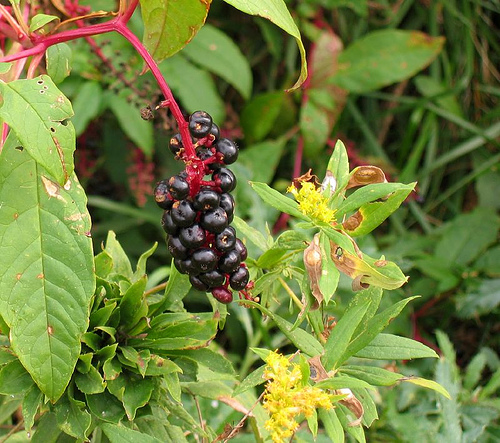
Ripe fruits of the pokeweed, Phytolacca americana.
(*photo credit)
May 14, 2011 Poke
Salad Time and Festivals
Today,
in Blanchard, Louisiana, there is a Poke Salad Festival -- and in other places
in the South people are also enjoying the glories of this productive native
plant. Poke has always fascinated me; as kids we would paint our arms with poke
berries to the horror of others who did not comprehend our child's play. Yes,
but there are far more aspects to poke than the extreme poison of its roots, and
the mild effects of the berry as a homemade medicinal. I have long regarded
poke's edible shoots as the welcome sign of springtime.
Poke
dishes abound for Appalachian people. We break off the fresh sprout that will
grow back in a matter of weeks. These can be the size of asparagus spears and
cooked with the same preparation after boiling twice, draining, and throwing out
the water. The poke leaves have the taste of spinach in all its rich and
nutritious greenness; the leaves can be eaten with vinegar and a sprinkling of
salt and pepper. The sprout should be stripped and harvested while it has an
early green skin; the sprouts can be coated in cornmeal and fried, or creamed
(like asparagus), or treated with a vegetable oil and lemon seasoning -- and
possibly bacon bits; often, cooked poke shoots are eaten with eggs and bacon.
Mountain people use the term "Poke Sallet" and refer to a dish eaten with fried
bacon and cornbread. Variations are listed on 365 Salads on this website.
Other recipes include ingredients such as sesame vinaigrette, jalapeno peppers,
and macadamia and scallion pesto.
As
the season progresses the red-coated stalks appear. That never fazes some of
us, as we strip off the maturing red skins and boil with two changes of water,
and proceed in the manner of preparation previously described. Some fear poke--
and it is possible that folks may have digestive problems, so a little caution
may be needed. Still, poke has advantages, a noticeable one is that the plant
regrows in the same location year after year. Another is that the plant
weathers drought wonderfully and requires no irrigation or fertilizing; the
plants reproduce at an astounding rate -- and the taste is as good this year as
last. For quantity, quality and maintenance-wise, nothing beats this native
plant that can become a staple of a greens patch with little labor involved.
The
Tennessee Polk Salad Association has a major meeting each year. Note the
spelling "Polk" in the State with its native son James K. Polk and the Elvis
Presley recording of a song by the same spelling. Note also that the
Association has a disclaimer that its recipes and materials are meant for
information and educational purposes only. Many folks regard the poke plant as
poisonous for a number of reasons; talk to your physician if you question the
use of it. The root, while highly poisonous, can be used as a natural pesticide
and also with precaution as a medicinal.
Prayer:
Lord, teach us to use what we have in our wonderful native plants, and to do so
with discretion and proper care.

A view along the Sheltowee Trace.
(*photo credit)
May 15, 2011
Becoming Sheepgates for Others
I am the gate. Whoever
enters through me will be saved, and will come in and go out and find pasture.
(John 10:9)
Jesus is the Good Shepherd
and invites us to become his helpers and fellow shepherds. When we speak of the
sheepgate it is an applied way to treat this sheep metaphor. I recall visiting
a goat farm once; a young kid got loose and ran frantically up and down the
fenceline of the neighbor's farm trying to get back to the flock. The family
had to take time and go over to the farm and retrieve the frightened kid through
gateways that eventually led to its return to familiar territory. The kid was
secure again!
Human
faults build fences, tall and unclimbable. All sinners wall themselves in,
imprisoned by their own hands. Each needs a way out, a gate with well-oiled
hinges and easy latches -- a way to leave the prisons of the mind and heart.
Thank God for mountain gaps and passes, for paths and roads, for coves and
gorges and fords and smooth flowing water. Thank God the sinner can still find
these among the shadows of a dying year -- and through some new beginning go out
to broader space.
Appalachia: A Meditation, Al Fritsch, SJ and photographs by Warren
Brunner, Loyola University Press, (1983), p. 138.
In
enclosures, we may find safety, but through gates we exit and enter freely.
Gates provide a way to freedom, the passageways to the horizon, the needed way
in and out. Jesus, as good shepherd is the tending and merciful one. At times
we need to stay within the fold for companionship and safety; and Jesus helps us
do this. At other times we venture forth because our hearts are truly restless
for the completion of our journeys of faith. As we say at Pentecost, we need to
venture forth from the community and to return for refreshment by and with the
community. Jesus calls himself the light, way, lamb, shepherd, life, and the
sheepgate. Jesus is our passageway from Earth to eternity; he helps us find
safe resting places on our faith journey, life's ins and outs.
The emphasis here is on the
shepherd, not the sheep. We are not dumb sheep; rather, all must use sheepgates
and help others do the same. With Christ we learn to become good shepherds and
help a wandering world to find its way, to get refreshment and safety from
enclosures, and yet to move out in daylight to new pastures. This is the task
of committed Christians: to follow and learn to lead with all the expertise it
takes. We are the gateway for others to follow and to orient their own lives.
We could make it difficult or easy, and thus we are challenged to act
properly. The hope is that we show the love and mercy of the Easter season.
Gates seem so simple, for they open and close easily. The task is to help
frightened and lost sheep find the gate.
Prayer:
Lord, teach us to follow you not by slavishly entering and leaving after you,
but by helping others who are wandering outside or trapped within to find their
way in or out.
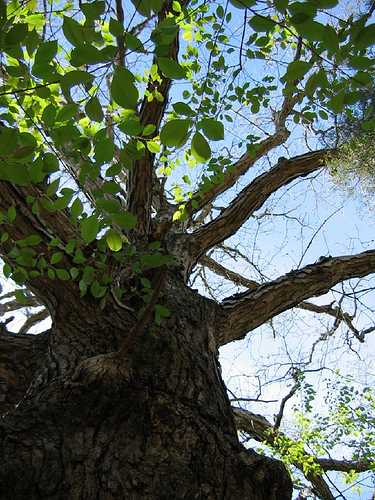
Looking up!
(*photo credit)
May 16, 2011 We
Need
Trees for Many Reasons
Trees are becoming
endangered in certain places and among some varieties (hemlocks, elms, dogwoods,
certain oaks, etc.). Trees are valuable to our world, and so we should
encourage students to write essays on "We need more trees because they --"
serve as habitats for
wildlife;
act as the lungs of our
planet;
mitigate climate;
shade us in summer;
support swings;
cool surroundings;
act as wind barriers in
winter;
offer sap that can be boiled
down into sweetening agents;
are beautiful to behold;
provide names for towns and
streets;
help furnish that beautiful
dash of autumn color;
clean the air by catching
airborne pollutants;
retain moisture;
store carbon dioxide as a
living storage system;
mark the countryside by
their distinct shapes and locations;
furnish fruit for the
taking;
and nuts in abundance;
are sacrificed to make
timber products;
populate a forest with its
own inherent value;
are resting and nesting
places for birds;
have potential to be
memorials for the planters;
become energy savers when
planted in urban areas;
give off fragrance when in
bloom;
remind us of better times;
increase the sales value of
property;
provide a hidden refuge for
tree-house dwellers;
make us look heavenward;
outlive most of us,
reminding us of our mortality;
soothe the harshness of a
ruined mine field;
become hitching posts;
protect us during unexpected
showers;
become part of a viewscape;
attract visitors;
whisper in the breeze;
fix in our memory youthful
joy;
are signs of life in the
desert;
allure those who need to get
away;
act as balm for the wounded;
serve as escapes from
dangers;
can become the lightning
rods of our property;
invite good pruning and
other management practices;
are a blessing to us all;
and
give glory to God by their
presence.
Prayer:
Lord, help us to see how valuable trees are to us and to spread the Good News.
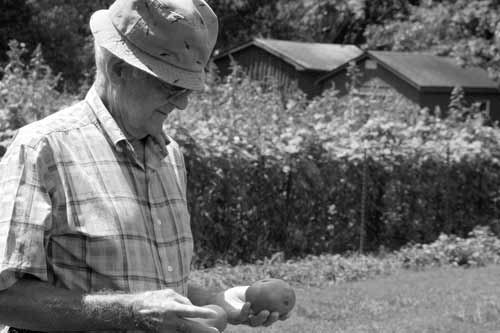
Inspecting and admiring garden-fresh tomatoes.
(*photo credit)
May 17, 2011 Decisions
During a Tomato Year
Some
who grow their own tomato plants will say this is a little late to be reflecting
on "tomato year" in the northern temperate climate. Perhaps, but many of us do
not start our plants from seed but purchase them from others who maintain
greenhouses; we prefer simply to grow and harvest the luscious fruits in due
season. All things considered, these tips may be helpful:
Stake or not stake?
My late Uncle Ed used to stake only half of each crop -- gambling that, whatever
the weather, some plants would prosper. A dry season tended to favor the
unstaked variety and a wet one the staked plants (from opportunistic diseases).
Variety
or not? Most would agree that people like certain varieties of tomatoes,
depending whether they are eaten in fresh salads or how many are canned or
stored for future use. A good canning tomato is not necessarily chosen for a
salad or sandwich. Variety allows for a longer growing season and an assortment
of flavors during a productive period.
Solely
planted or interspersed? Those of us who prefer the tomato at every meal
know that we have to grow quite a number. For those with a shortage of arable
space we seek to intersperse tomatoes among other vegetables. Tall tomato
plants take less room and allow for early spring crops to mature before needing
more space. Planting tomatoes within radish, endive, kale, spinach and mustard
patches allows double use of the ultimate tomato lands. Even cucumbers amid the
tomatoes work quite well, for their vines act as living mulch while the tomato
plants are growing.
Extended
season or a simple taste? Many folks do not like as many tomatoes as this
writer eats in the year, and so prefer to curb the summer season, and move on to
other autumn crops. I like an extended season going from at least late June to
November. If you pack green tomatoes in paper they can be enjoyed at
Thanksgiving and beyond. Greenhouses and special varieties offer longer
seasons, and "Tommy Toes" are candidates for such choices.
Water
or not? Watering is a necessity if we desire a plentiful harvest in dry
times. Irrigation is preferred, but can be done conservatively by use of water
inlets very near the plant roots; this avoids watering the foliage where it is
not needed.
Preserve
or give away? Both saving and giving are favored if the tomato harvest is
good and neighbors would appreciate the surplus. One can preserve in many
different ways: deep freezing, making catsup or sauce, canning whole tomatoes or
as juice, drying into a leather, or wrapping in paper and storing in a root
cellar for late autumn and winter. Fresh or preserved, tomatoes make good and
appreciated gifts.
Prayer:
Lord, help us to teach others to grow wholesome produce, to become expert
growers, and to share their expertise.

Rose acacia, Robinia hispida, Wolfe Co., KY.
(*photo credit)
May 18, 2011 Every
Person Is Irreplaceable
When
a friend or relative dies we know they will be more than missed: they are
irreplaceable. They are unique beings created by the hand of an infinite and
all-powerful creator who made all the universe composed of billions of diverse
stars and planets. The same might be said of unique snowflake designs, though
who can prove or disprove that phenomenon, since no similar patterns have been
detected? Yes, we know more about people than about stars and snowflake -- and
all human beings are different. Granted, designers of occupational positions
specify slots that they want to be perfectly replaceable. However, that is
wishful thinking; we may conceive of special molds, but the ones expected to
fill those molds are, thank God, unique persons.
We
seek for children or grandchildren to be "chips off the old block," or similar
to parents or grandparents -- but they simply are not, and it is wrong to think
they ought to be. WE ARE DIFFERENT, and we ought to celebrate differences as
much as similarities. What is more difficult in such groupings of supposed
sameness and dissimilarity is to have people fill our ill-formed stereotypes.
Those who speak of types of personalities have things to say, but they must be
careful, for everyone comes as a surprise once we know them thoroughly. We are
not cannon fodder for senseless generals to use on their chessboards nor workers
to fill slots of faceless industrial or computer banks; we are created in the
image of an all-creative God.
Celebrating
differences can be liberating. We are not what some who do not know us expect
us to be; we are meant to plot our own course in life and not follow footsteps
of others we cannot possibly fill; we are to be judged individually before the
Divine Author of all differences, not by judges filled with biases and
expectations fashioned on unmerciful limitations. As irreplaceable, we can be
missed genuinely even when disliked or having manifested severe limitations.
God loves each of us and asks all of us to do the same -- so our uniqueness is
somehow related to godliness, at least remotely so.
Those
who follow models, or saints. or heroines/heroes, or celebrities, or champions,
or ancestors remember: God created us to be who we are. Yes, we are social
beings who must surrender some of our individual likes and dislikes for the sake
of the greater movements of this world. However, regimented sacrifices come at
a price that should always be recognized and calculated. Replacing one person
with the image of another is an impossible task with inherent limitations.
Thinking it possible is a grand deception.
Prayer:
Lord, help us be who we are, to be thankful for the blessed chance to live, and
also thankful for the other good souls we cannot be or pretend to be -- but from
whom we can learn much by simply knowing. On second thought, don't let our
irreplaceability hinder our coming together as one body.
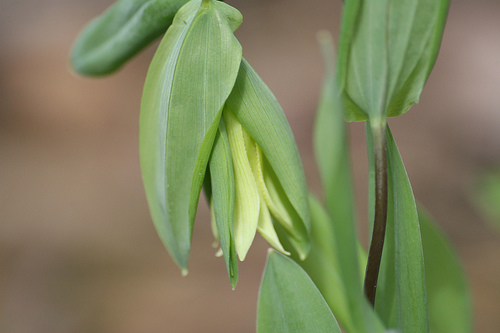
Bellwort, nodding in the breeze.
(*photo credit)
May 19, 2011
Radical Sharing Reconsidered
John the Baptist answered,
If anyone has two tunics he must share with the one who has none, and the one
with something to eat must do the same. (Luke 3:11)
In our attempt to reclaim
the commons for all, basic attitudes on the part of all parties must be
reconsidered. We need a radical sharing that flows from and understands
the essential needs of all people (social awareness), that permits the giving up
of excess without a basic struggle (solidarity), and that trusts resources taken
will be used properly (cooperative trust). All three components are necessary,
and each calls for ever-deepening levels of service. Radical sharing has a
hidden power to control self interest, to build sociability, and to lead
ultimately to a harmonious global community. Awareness that giving is necessary
changes to imperfect or selfish giving, while retaining some surplus. A deeper
sharing results when takers collectively demand all, and not just a fraction of
the surplus -- for such surpluses holds back the total community's progress.
Simultaneous
giving and taking with the good of all in mind allows for growth in a spirit of
togetherness that gains strength with time. If all parties merge toward perfect
harmony, one gives and another takes, and administers justly what is taken. The
basic attitude is one of gratitude directed principally to God, giver of all
gifts, but also extending to the givers for the sense of magnanimity, and to the
takers for being merciful and not showing revenge. Radical sharing goes to the
root of motivation and to a compassionate love of the human family, all of whom
will benefit through the act of sharing. All give up something: those with
resources must give up what does not really belong to them; those who take, do
so for the community and not for selfish reasons. Givers give up all; takers
give up self interests.
On March 27, 2007 we wrote
about heroic and extreme forms of sharing such as organ donation. Sharing of
surplus wealth by individuals or by nations is of a lesser degree, but necessary
nonetheless for establishing a just social order. Such radical sharing leads to
liberation of people, both the holders of excess and those who are destitute.
All liberate and all are liberated. The Spirit is the catalyst, and all sharers
serve as witnesses and catalysts. Those who practice sharing in common are
candidates for being agents of change, for what is done on the local level must
now be globalized. We are to share resources fairly with all people. Ideally,
that involves a parting with one's excess, but if that is not achieved, a
merciful taking must ensue for the benefit of all. Both givers and takers may
exercise freedom and grow in freedom through generosity. Radical sharing is the
realization that, what one gives and another receives when done freely and
non-violently, binds the world more tightly together as one people.
Prayer:
Lord, teach us to share and to break the barriers that hold us back.
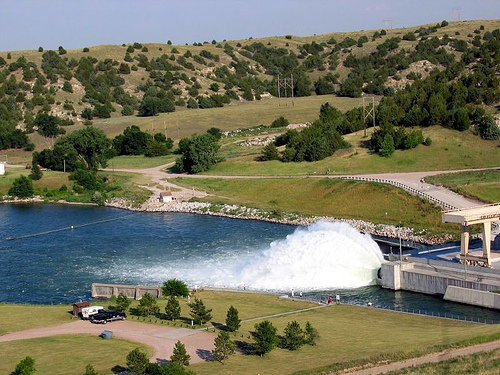
Lake McConaughy, Nebraska.
(*photo credit)
May 20, 2011
Awareness of Impending Water Shortages
Water,
water may be everywhere in the vast oceans, but water that is potable and pure
enough for irrigation is quite limited in many parts of this country and the
world. "The Drying of the West," (The Economist, January 29, 2011, p. 32)
tells about a water crisis looming in the Colorado River basin, especially for
the desert city of Las Vegas, but also for much of Arizona and five neighboring
states as well. A decade-long drought has caused Nevada's Lake Mead to be at
only 40% of capacity, but how much this is due to climate change is unclear.
The crisis is intensified by demands on the Colorado River's water in the basin
and service area.
Is
this shortage a foreshadowing of other water crises to surface both soon in
American and other major global metropolitan areas? Some people do not become
alarmed because they are confident that modern water demands could be curbed
quickly by rationing the precious liquid. Why all the swimming pools? Why grow
green lawns in the desert? Why all the water used for washing vehicles and
leaves off pavements? Certainly elementary water conservation measures delay
crises until later -- but not for the long term. Desalinating ocean water for
use has a promising future, but solar processes are not immediately applicable,
and taking salt out can become expensive.
One
can discuss the water crises as fourfold: physical, legal, political, and
cultural. Droughts, however caused, bring on depletion of available water
sources; legal differences can result from how water is assigned by previous
long-standing agreements before shortages cropped up; politically, people within
the areas of need have different degrees of influence in water decisions.
Serious "water wars" can develop in the upcoming years. Legally, an
established "right to water" may be permitted for growing certain water-prone
crops, watering lawns, or filling the pool when others are forced to ration
essential water use. Water problems call for cooperative action in order to
avoid possible friction.
A
right to water applies to all, and thus water is part of the commons. Powerful
corporations or individuals should not take over the sources and require
payments according to their own profit-making schemes. Water, like air, ought
to be free. More than ever, communities affected must form water districts
capable of treating all parties fairly. However, should people be allowed to
grow lawns of bluegrass or irrigated cotton in water-short western regions?
Some call Las Vegas' emerging problem a canary in a mine shaft. If the emerging
climate-change picture does not alter rapidly, expect more water shortages.
Thirsty people can raise a storm of protest, much like those suffering from
rising food prices. Promoting water conservation along with solar desalination
of brackish and sea water are high priorities.
Prayer:
Lord, the Calvary words "I thirst" are being heard in many parts of the world.
Will we be able to hear, listen and respond in ways to help redistribute potable
water to all in need?

Fort McPherson National Cemetery.
(*photo credit)
May 21, 2011 The
Ambivalence of Armed Forces Day
When
our American military are engaged in the longest war in history in Afghanistan
(now passing the Revolutionary War's length) it seems unpatriotic to be overly
critical. Each Sunday one of our public liturgical petitions is for the safety
of those in harm's way. The major group of Americans in such predicaments are
the Army, Navy, Air Force and Marines who serve our nation and world in this
time of conflict. Let us never cease to pray for peace.
Yes
to personnel needs. No one wants to undercut the essential needs of
military personnel and their dependents. They ought to have proper supplies and
defensive gear, as well as appropriate housing and other amenities for their
families. Thus, protective equipment for individual members of our military
should be a high priority in any budget. Buying such items is not the same as
purchasing sophisticated weaponry costing millions of dollars, some of which
Secretary Gates wants halted.
No
to military industry wants. Almost half of the entire world's military
budget is paid (or borrowed) by our federal government for the upkeep of
America's military forces -- the most sophisticated the world has ever known.
But do we need aircraft carriers and missile defenses and far-flung bases in
countries that could defend themselves? The myth that we must constantly
increase military budgets out of loyalty for our service members is simply
feeding an industrial-military complex that President Eisenhower warned against
in his farewell address in 1961. We are beholden to a system that is
not-so-much defense, but rather wanton profit-making consumption of precious
resources. A far better defense would be to redistribute a heavy portion of
those defense dollars for appropriate food production, water distribution and
affordable housing of hundreds of millions throughout the world.
Yes
to military defense, but ....No doubt, a military presence is needed. Our
military personnel deserve good protection and proper supplies. We do not have
to saddle our military with super-expensive devices that are of little use in
current combat zones -- and timeliness is associated with profits. The defense
industry is not part of Armed Services Day. A military presence was needed when
the tsunami occurred in Indonesia, and our military came in full force to assist
stricken victims. Thank heavens! We are starting to learn a lesson: military
discipline can be used well for the benefit of suffering people, the victims of
natural disasters. Defense ought to be directed to natural disasters and
military personnel trained in instant global response in times of tragedy.
Prayer:
Lord, watch over our defenders; let them come to know what real defense is all
about, and to be trained to be first responders in time of global emergencies.
Help our nation to move away from the outmoded militaristic postures of the past
to one of caring concern for populations endangered by natural causes.

Dwarf iris, Natural Bridge State Park.
(*photo credit)
May 22, 2011 Being
of Service to Others
I am the way and the
truth and the life. (John 14: 1-12)
Diaconia means the
call to give service in the Church, both those called to the priesthood,
deaconate, or religious life, and those who are called to ministry of healing,
educating, lecturing, cleaning, performing music and dance, or engaged in
environmental modeling of the community. The Acts of the Apostles shows
the gradual movement from Jerusalem to Rome, and the spreading of the Word first
to the Jewish community, and then to the world. As mission expands, offices or
services or ministries develop with it. Greek names appear in the deacon's
listing. With time millions respond to the vocational call to minister within
the Church.
Peter is that first
bridge-builder in the Church; as first pope, Peter lays the cornerstone and we
hear the Scripture: You are a chosen race, a royal priesthood, a holy
nation, God's own people. Yes, this passage extends beyond Peter and
includes the priesthood of the faithful, not just the ministers of the Liturgy.
The invitation in these critical times is for all of us to help build bridges
among divided people. The goal ahead is lofty, but the road to reach this goal
is rough and takes all of us working together in mercy and love.
Jesus
is the way that we are to follow in our journey of faith. Jesus is the
truth that is the foundation of a common understanding allowing us to
work together in order to establish the Kingdom. Jesus is the life, a
divine family in which we are invited to live through the grace of Baptism. In
turn, we become Christ to others and show them the way that they are to travel;
we are to present Good News, the truth of the Lord's presence. We are to live
in such ways that others will want to imitate us, not in worldly ways of total
affluence. We ought to consider this call to be like Christ as a sacred duty,
for we are a chosen race, a holy nation, God's own people.
Late May is graduation time
for many students as their educational journeys from kindergarten through
technical or professional school wind down. Graduation means a change in
location and stage of learning and maybe career. We add to the worthy
graduates' celebrations through support, prayers and meaningful gifts. We can
become the way, truth and life for them. We realize the effort it will take for
the one moving on the way to adjust to new, difficult, and even risky
situations. Part of serving others is to aid in the transition through prayer,
encouragement and helping them discern their next step. A healthy society and
church need all posts filled. Let us emphasize that making a wise choice is
important for them personally and also for our society. Give these people
options, for these are very troubled times and they are soon to become keenly
aware of it.
Prayer:
Lord, inspire us to assist others who are on the road to their own achievements;
help us to help them decide what to do.

Little brown jug, Hexastylis arifolia.
(*photo credit)
May 23, 2011 Clean
Nuclear Energy? A Lie!
President
Obama and a host of federal legislators may feel beholden to purveyors of
promises about "clean" nuclear power. This "clean" is an utter falsehood, worth
confronting by those of us who are not persuaded by nuclear industry
propaganda. Ask each legislator willing to vote to greenwash nuclear power, how
much financial support they have or are receiving from that industry:
1. Nuclear power uses uranium
that has been proven to pollute places where mined, processed and enriched as
well as causing countless health problems for workers at various levels of
processing;
2. The spent fuel remains a toxic
problem for centuries, with no final safe waste storage place yet established in
this country;
3. Remember Chernobyl! One
mishap could do vast damage to entire areas of the nation (some with dense
populations);
4. Nuclear powerplants are
tempting targets for terrorist attacks, and thus the major need for guarding
these facilities;
5. The immense expense of
building a nuclear powerplant is to be expected (about eight billion dollars
each), for nothing could be allowed to go wrong without immense consequences;
6. Radiation may be odorless and
undetectable by eye, but it is being released at all levels of the operation,
not just when accidents occur. There's NO safe level of radiation exposure;
7. Spent fuel pools could be
subject to a "zirconium" fire if the national electrical grid system were
paralyzed by a solar flare. A recent Oak Ridge National Laboratory report says
that such a flare in this century could cut grid power from one to two years,
for two-thirds of America's 104 nuclear powerplants;
8. Nuclear powerplants are so
risky that no single utility would ever dare pay insurance costs without
governmental guarantees;
9. Coal is often used as a
principal fuel source to operate plants that help enrich fuel in nuclear power
facilities, as well as process structural and operational materials;
10. Per kilowatt, produced
nuclear power causes six times the amount of carbon emissions as does windpower
and two to three times more than solar power.
The only major reason the
temptation exists to declare nuclear energy as "clean" is because of the money
given to the legislators to declare it so. There is nothing clean in that
either.
Prayer:
Lord, make us honest and trustworthy in our use of language, and to bury the
myth that nuclear power is clean.

Evening grosbeak feathers (Coccothraustes vespertinus).
(*photo credit)
May 24, 2011 The
Ministry of Shared Suffering
Radical
sharing means going to the deepest level of our emotions, finding there the
elements that stir us, and then bringing them forth and sharing them with
others. The bringing forth of our compassion involves inviting others to share
in life. This sharing of suffering in all its forms is a way to spread the Good
News, a sense of belonging to the Lord with others. Nothing hurts more than to
suffer alone and without any sense of sharing; nothing is more comforting than
to know that what hurts is somehow transmitted in a spiritual way to others --
and that they also enter into this community of suffering.
In
the heart of all activity is the hidden power of love, that power that is
repressed by those who hate and who refuse to love. However, love that is
expressed overpowers all evil. That is why those who suffer must be made to
discern their own suffering as sent as a gift sent by God for the good of
others. Saint Theresa, the Little Flower, understood this in a very special
way. She suffered with her tuberculosis and really never recovered; she
experienced no startling miracles in which she rose from her bed and went off
doing great deeds for others. She suffered willingly through the condition
given her, and was immensely productive as an example after passing on. Her
hope was that if miracles occurred, they would occur later -- and they did so
globally.
The
ministry of suffering is meant for everyone but is principally the focus of
humble sowers of good deeds and not reapers of them. Often the spiritual
benefits are delayed until after the sower of seeds passes on. Our spiritual
life has a mortal/eternal continuity and we are often reluctant to speak this
truth to the ill, elderly, and immobile. However, this is a worthwhile subject,
for many people want something in the future to look forward to and realize that
salutary effects spring from their current sufferings. They want to know that
after their current immobility they can run, skip, dance and move about at will
in an indefinite future. Yes, they suffer while they hear the distant music and
celebrations. The future awaits them -- and us.
Shared
suffering is a reality in which we can all take part and contribute positively.
In an age of activism, some regard sufferers as living lower qualities of
life. However, passive suffering is salutary and, when offered in a positive
manner, can be highly productive. This is a valid ministry, a communion with
Jesus on Calvary, a purification of soul, a growing vision, a spiritual reality,
a shared experience. When we are not yet in the reality of suffering, we ought
to learn to be cognizant through a compassion that can extend to all in our
troubled world. Sufferers await the Good News that their situation can be a
shared one. An added benefit is that all can participate, not just sufferers.
Prayer: Lord, teach
us to share and to discern the imperfections that hinder us from learning the
gifts of suffering that others have to offer.

Urban scene, passing through Cincinnati, OH.
(*photo credit)
May 25, 2011 Urban
Centers: For Better or Worse
A nobler want of man is
served by nature, namely, the love of Beauty. Ralph Waldo Emerson
I
recently heard a National Public Radio guest espousing the good qualities of
urban life: proximity to places of work and business, public transportation,
social life, and other amenities. The assumption was that with more people
there is an economy of scale; with over half the world now crowded into cities,
this means the population has voted for cities by moving to booming metropolitan
areas. Certainly health and educational centers cluster in urban areas, as do
museums, night-life, concert halls, and festivals. Fashion is more urbane;
restaurants are more varied; speech is more cosmopolitan. People are attracted
to where the action is -- and to where the better paying jobs are located.
Today, our policies favor concentrating funding to the urban area, and thus the
location of higher-paying, employment opportunities, but is this the whole
story?
Only
a few weeks before writing this, I talked with my provincial superior and we
realized that much of my work was not dependent on geographic location, provided
that basic communication systems (such as broadband Internet) were available.
The key is to have freedom of mobility, and the Internet allows for this.
Granted, some places have less Internet access, but benefits accrue in
less-congested areas as well as urban ones. On this birthday of Ralph Waldo
Emerson, advantages of less-congested places may be worth promoting.
Certainly, a less-crowded and noisy countryside has advantages, as well as its
slower pace of life. All things considered (and with good paying jobs in the
non-urban areas), the vote could swing heavily towards country life, provided
communications and transportation are reasonably available. Today many writers
and independent operators opt away from cities.
I
will not live long enough to see this movement away from cities, but several
factors point to that counter-movement: universal Internet and phone service can
counter urban communications advantages; terrorist threats turn people away from
congested areas; noise factors are harmful to human health; higher food prices
lead more people to grow their own produce; improved public transport renders
more rural areas accessible to distant urban ones; trees are more desirable as a
forested non-urban phenomenon; social networking reduces the need for constant
physical connections and proximity to work; business, banking and purchases
require fewer trips to malls with more taking advantage of Internet commerce;
higher city temperatures in summer favor non-urban living conditions; and air
pollution will be troublesome in urban areas even with electric cars and
renewable energy sources.
Prayer:
Lord, make us indifferent to where we are located, provided that we can do your
will and touch the lives of those who need us in some way.

Buffalo Mountain wind farm. Near Oak Ridge, TN.
(*photo credit)
May 26, 2011 Windpower
and Changing Landscapes
Windpower
is coming, and is certainly more environmentally
friendly than fossil-fuel and
nuclear facilities. However, some people object to windpower for various
reasons. One objection that is so often overlooked is that property-holders
make money on the turbines situated on their land; however, nearby residents
feel cheated when they have to "suffer" the change in scenery with no monetary
benefit. One answer is to adjust local taxes to include the money-making
turbines so that local schools, roads and other public services benefit more
from their presence.
While
that objection is unspoken, the threatened change in viewscape is often a major
concern. As mentioned in our essay of December 20, 2007, wind development has
detractors who cite environment issues, e.g., viewscape deterioration, noise,
and bird kills. Cape Cod residents object to the first Massachusetts off-shore
wind farm, for this will mar their unobstructed and privileged views. However,
is this a valid objection in an age in which critics also use electricity? Are
they wanting to go back to Civil War times when transmission wires were absent
from the idyllic landscape -- and when residents cooked and heated water without
electricity? Some improvements demand sacrifices. Dutch windmills used to pump
water and to grind grain, and are now regarded by tourists as positive scenic
assets, beautifying elements in monotonous lowlands.
What
about the swishing sound of the turbine? Does this disturb the neighbors as
well? Recall that other environmental negatives, such as polluted air from
fossil-fuel plants, cause breathing difficulties for those living near the
powerplants though distant from many privileged users. Sounds may be annoying
until one gets used to them -- and they hardly compete with some modern music,
which can harm eardrums. The rotating blades kill thousands of birds flying
past, but plate glass windows result in millions of bird deaths, when the
animals become confused by objects in their flight path. Some turbines close to
residences cause interference with communications' signals of various sorts.
Furthermore, really close turbines can cause some vibrational disturbances.
Nothing is perfect, and hopefully the wind turbine will be far enough removed to
allow for peaceful cohabitation.
The
landscape is changed by electricity-generating powerplants and transmission
wires and hills leveled through mountaintop removal. However, I mute my
objection to this last environmentally negative practice because I use
coal-fueled electricity; it is similar to imitating Thomas Jefferson and his
ambivalence about his slave "property." However, one solution is to fight for
renewable energy in all its forms, and windpower is one of these. Objections to
windpower, exist but they are nothing compared to miners whose health is
compromised by radiation or coal dust.
Prayer:
Help us, Lord, to translate the mighty wind of Pentecost into the Good News of
renewable energy for all.

Water droplets appear as jewels.
(*photo by Sally Ramsdell)
May 27, 2011
Thinking with the Church in 2011
Is
"thinking with the Church" something that is old-fashioned? Let's look at this
from the viewpoint of a faithful member of a Church congregation. Not thinking
with a group is a negative attitude comparable to a flu virus that contaminates
the enthusiasm and spirit of an entire body. Groups seek positive approaches
for good membership growth. For the Church, the goal is to fortify by
liturgies, sacraments, and homilies, so that each person can help spread Good
News. This evangelical aspect of the Church's mission is key to active
membership. Positive thinking is paramount.
Positive-thinking
people need unifying words, pledges, creeds, commitments, and liturgies. If we
go overseas, we can follow the Mass even if the vernacular language is
unfamiliar; the ritual is standard in all nations. We are familiar and have a
basic trust that all are striving to work together for the betterment of God's
kingdom. Within our Catholic communion (in the Latin Rite), there is momentum
to prepare for some word changes in the Liturgy this November 27th. This is to
bring more of the entire English-speaking text closer to the official Latin
one. This is needed all the more because hundreds of small language
translations of liturgy throughout the world come through English and not
directly from Latin. English is a global tool for communication.
Negative objections can be
destructive; positive criticism can play an important role provided the critic
seeks a way to improve our togetherness. Critics who want to retain a more
familial English forget that difficulties arise in translation. The Principle
of Subsidiarity emphasizes doing what can be done best at the lowest level of
organization. Flowers for the altar is a local concern as is specific music.
Global communication needs to come from the broadest level because a large
number of groups are affected -- and the goal is unity. It is not a local
"privilege" for select local groups to effect the change of other local groups.
Communication ought to be from a universal source, especially when English is a
tool for the many who are not versed in Latin.
Environmentally
speaking, global regulation is utterly needed to save our endangered planet.
A fortiori, we need globally-functioning groups within the basic and
unifying aspects of our Liturgy, without denying that certain aspects could have
local content. However, we are not liturgical tea-partyers. We stand in place
of Christ --divine and human. The divine aspect has a more universal and solemn
character; the human includes the fact that we are not automatons or robots, but
express our devotion in uniquely human ways. The incarnation mystery is
revealed in part at Mass, and the priest needs to be godly in solemnity and
human in touching people -- a difficult balance. A rigid legalism is a typical
American temptation, but has no place in the Liturgy.
Prayer:
Lord, help us to pray as one universal body and yet also act in ways that
encourage local congregations.
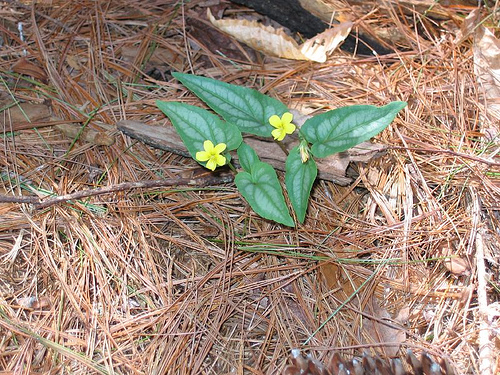
Halberd leaf yellow violet, Viola hastata. Red River Gorge, KY.
(*photo credit)
May 28, 2011
Haircuts: An Earth Healing Topic?
What's the matter? Have
you run low on topics as you near the 2,000 mark? Yes, haircutting is a new
topic, but it can be justified as a worthwhile subject for several reasons. We
need to be respectful of appearances to a certain degree, for we can influence
others to do the same -- and our wounded Earth needs deep respect and caregiving.
If armies are in retreat and only limited supplies are available, how about
issuing combs? Proper grooming has a place in keeping spirits high, and that is
needed for healers as well as comedians and artists and musicians.
After
plugging the important services of barbers and hair dressers, comes my
disappointing comment: I have not had a professional haircut since 1980
(immediately before my parents' 50th wedding anniversary). Yes, I have plenty
of hair and thin mine every month lest it grows out of control. You see, my
decision to go personal in haircare occurred at the time that the Jimmy Carter
Administration (which was so good to public interest folks), was coming to an
abrupt end (Jimmy lost his bid for a second presidential term to Ronald
Reagan). In fact, the Reagan crowd called me and others to Washington, DC, and
dismissed our "Science for Citizens Program" in one stroke. It suddenly became
evident that tough times were coming -- and so personal haircutting became a
mandated economy matter for me. I was reminded recently that this practice has
saved $4,000+ during a three-decade, personal cutting period.
The secret to self-administered
haircuts is to have thick hair or none at all. Nicks and marks are easily
covered over for thicker-haired people, and others have no cutting needed. In
fact, having few salutary features at old age, I find the only public notice
comes because of my head of hair -- God's gift. Once someone even asked if I go
to a stylist. My reply was true, "No, I'm too cheap for that." But financial
savings is not the only advantage; personal hair-tending takes only a few
minutes every week, and so time saved by not going to barbers (wherever they are
located) is time available for other worthwhile enterprises. What is the point
of this reflection? Be cheap? Do it yourself? Save money -- and time? Learn
to be yourself? Forget what others say? A good answer is that the homesteading
tradition that is needed today is strengthened by such practices as
self-barbering.
Trade-offs
must be acknowledged. Support barbers. The barbershop is a place to exchange
ideas and engage in citizen discussion. Conversing with our neighbors enhances
social capital. However, I'm reminded that patronizing barbers keeps money in
the local economy, and barbershop customers have more to give others than just
fees -- and we who seek to economize on time ought to take note. In making
social sacrifices we lose something for ourselves and others, a grace that comes
with conversation. Maybe my walking through the neighborhood is a good
alternative.
Prayer: Lord, I have
nothing to say or pray on this subject.
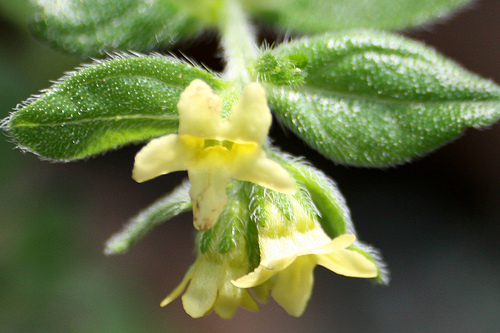
Yellow horse gentian, Triosteum angustifolium. Cedars of Lebanon, TN.
(*photo credit)
May 29, 2011
Learning to Do Good Deeds through Self-Control
If it should be God's
will that you suffer, it is better to do so for good deeds than for evil ones.
(I Peter 3:16)
The Spirit is alive within
us and teaches us to live through good times and bad. As we prepare for the
upcoming season of Pentecost and the ordinary knocks of life, we discover that
this is meant to be a teaching/learning period of the year. We are trying to
imitate Jesus and the qualities he exhibits during his ministry (patience,
mercy, controlled anger, listening, attending, healing, etc,). Being a good
Christian has its ups and downs, and we are called to live as we are called to
be and do, or in a loose manner of speaking, "ride with the tide, go with the
flow."
Jesus, our teacher through
the Spirit, indicates the path we are to take: we are to live a good life; in
doing so we assist others to do the same. The two (love and service) are joined
and not observed singly, as though individual perfection by attending to self
and service to others are separate. Jesus is perfect in his individual life;
and Jesus heals, teaches, dies and rises for us. Through perfect living and
perfect service Jesus indicates to us a path that we are to follow.
Now
we come to something that we have learned through modern research and studies:
children who are taught self-control have fewer addictive problems and better
financial and physical health later in life than those who are not.
Self-control comes in part through a child's imitation of parents, teachers, and
others who these children imitate. Can we celebrate our learned (not inherited)
self-control and realize that this involves religious practice? This becomes a
touchy subject, for many would say that later problems have many causes, and
they place the onus on freedom of the person who chooses misdeeds. The
Paraclete or Spirit works with us, and we work with those who mentor us in many
ways. We learn to move about properly and ultimately to succeed in what we are
trying to do. Learning, without the harshness of episodes of lack of control
that hurts others, opens us to better service.
To
do better service takes practice, and self-control is a key ingredient in this
practice. Furthermore, the part that our faith plays is utterly important; the
time we spend fasting and abstaining or confessing our faults has a part to play
in our self-discipline. No one is perfect, and so we accept penitential
practices, not just for personal salvation (though needed also), but for the
social good of all through our improved service to others. Jesus tells us that
to love means to control our lives and to move toward perfection. The message
is so simple, but also so often unheeded. We prefer gimmicks that are shallow
and forget that a ministry of service requires watchfulness and practice.
Prayer:
Ever-living God, help us to celebrate our joy in the resurrection of the Lord
and to express in our lives the love we celebrate. Open us to ever greater
service to and for others.

Grandma's flowers.
(*photo credit)
May 30, 2011 Memorials:
Real and/or Artificial Flowers
I have never met a person
who valued artificial flowers more than real ones -- yet we all know that
artificial flowers have their place. Flowers of whatever types and kinds have a
certain gradation of value, but are inherently worth something. The flower is
our way of expressing remembrance and gratitude for the person to whom they are
dedicated. Real flowers are fresh and have their scent and fleeting beauty.
However, artificial flowers last longer. Yes, Memorial Day includes both the
real and artificial.
Growing
flowers are of longer endurance than those that are cut and laid on graves
as remembrances -- but growing them takes continued effort. Rarely in America
do we find the European custom of tending graveyard plots with potted plants and
freely-growing flowers. However, when in Lee County, Texas, a few years back
with my sister to visit America's only Wend colony, we discovered to our
surprise that the burial grounds had people tending flowers. What acts of
devotion and love! I recall our great, great grandparents' graves in the
Rhineland in Germany; the growing flowers that adorned the cemetery were
incredibly beautiful and manifested a sense of care. The cemetery where my
parents, grandparents and some great grandparents are buried in Old Washington,
Kentucky, allows rose bushes to be planted at the individual plots. Thus, two
of my first cousins tend to graves, since my siblings have all moved away. We
are extremely grateful for their devotion.
Fresh-cut flowers
that decorate graves are also beautiful, but they last but a day and soon wilt
and die. My mother made a big fuss about selecting flowers of mid-spring
(lilacs, peonies, roses, poppies, bridal wreath, and tulips) to decorate the
graves of her loved ones. Some got almost a carpet of flowers, and others a
single flower -- but all were still remembered. I share her sense of obligation
to visit special graves at this time of year, and add some wild daisies -- for
that was what my grandmother said would be enough. Doesn't it mean more to the
flower-giver than the flower- receiver? Bonds still hold. In Switzerland, when
graves are unattended, remains go to an ossuary, and the space reused.
Artificial
flowers are often colorful, durable, and striking resemblances of real ones.
Some cemeteries are abandoned and the space is not needed for reburial.
Rather here, if loved ones have died or moved away, weeds appear and the place
reverts to wilderness that can have a healing effect over time. Any
sadness is not in return to wilderness, but that no one is around to care for
graves. Artificial flowers are an intermediate solution for the amount of
tending is reduced but not totally absent. Loved ones can place their
artificial bouquet and then return to a distant residence. Some burial "gardens" place artificial
flowers on every grave over a time period and then replace them when they fade.
These flowers give a colorful appearance from a distance, and a sense that
someone is attending.
Prayer:
Lord, help us say it with flowers -- and prayers.

Cinnamon fern, Osmunda cinnamomea. Wolfe Co., KY.
(*photo credit)
May 31, 2011
Discerning When to Drive or Not
As
the summer travel season begins, we ought to reflect upon our privileges to
drive on our public roads, on which half the population will be moving today.
That privilege gives a sense of freedom but also bears an awesome
responsibility. Many people regard themselves as more skilled drivers than they
really are, and many of us overlook the fact that driving skills and attention
change. Often quite-skilled drivers push themselves too hard.
Yes, this subject involves
curtailing our auto use in the not- too-distant future. Drivers on public
highways with powerful vehicles must consider the obligations to ourselves and
our older licensed relatives and friends, with whom we help plan their driving
ability. That is not an easy assignment. When will it be necessary to stop
driving? What effects will that have on one's sense of mobility? In a
car-filled society with almost as many vehicles as people, this becomes one of
the major lifetime adjustments requiring an honest discernment process -- and I
am preparing for it myself in a short while.
Multi-tasking. No
one is good enough to drive while drinking alcoholic beverages or taking drugs.
The list of forbidden substances and practices ought to be extended to include
texting or engaging in cell phone use. Use of those devices on a broad, empty
highway with no other car in sight may be exceptional, and certainly not the
rule. What about eating or listening to an engaging lecture on the radio? We
all know that there are times to stop and do what has to be done, including
making that phone call or eating something. Good judgment is required, but
thinking of those others on the road must always be a consideration. Others'
lives depend on our judgments.
Restraint.
The "when" may include a variety of times in which we may drive, and other times
when others could drive for us. Due to my eyesight, I try to severely limit
night-driving and refrain when it is raining heavily. The same holds for
refraining from driving in congested areas at rush hour. So it may be that
people either impose on themselves, or those under their charge, some form of
driving limitation. Granted, restrictions on certain driving for youthful
drivers have proved to curb accidents in-the-making.
Total
ban. This sounds foreboding, and certainly IS, for people who for a half
century regarded being "behind the wheel" as a sacred right. Many drivers
matured with their own vehicles -- washing, refueling, repairing, vacuuming, and
shining them. Now, when keys are withdrawn by necessity, advice, or demand,
some feel a loss as great as losing a limb or eyesight. To drive or not to
drive; to drive now or later; to drive here or not; to stop driving -- these
are issues that virtually all of us will have to face or help others face. Are
we prepared?
Prayer:
Lord, inspire us to see our driving as a privilege and to take all caution
needed to protect ourselves and others.
|